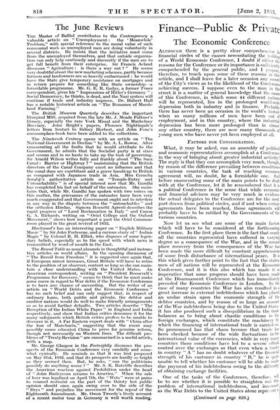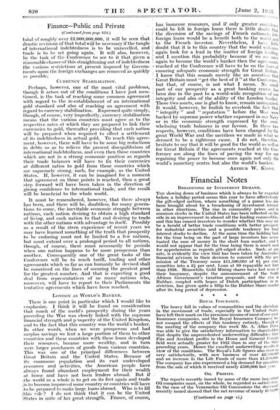Finance —Public 8c . Private
The Economic Conference
ALTHOUGH there is a pretty clear comprehension in financial circles of the causes necessitating the holding of a World Economic Conference, I doubt if either the reasons for the Conference or its importance is sufficiently comprehended by the general public, and I propose, therefore, to touch upon some of these reasons in this article, and I shall leave for a later occasion any record of the City's views as to the likelihood of the Conference achieving success. I suppose even to the man in the street it is a matter of general knowledge that the cause of this Conference, in which some 44 different nations will be represented, lies in the prolonged world-wide depression both in industry and in finance. Probably there has never been an occasion in the world's history when so many millions of men• have been out of employment, and in this country, where the industrial depression has been more prolonged than in almost any other country, there are now many thousands of young men who have never yet been employed at all.
FACTORS FOR CONSIDERATION.
What, it may be asked, can an assembly of political and economic representatives accomplish at a Conference in the way of bringing about greater industrial activity? The reply is that they can accomplish very much, though, by reason of the difference prevailing between conditions in various countries, the task of reaching common agreement will, no doubt, be a formidable one. And before enumerating some of the main points to be dealt with at the Conference, let it be remembered that it is a political Conference in the sense that while economic and financial advisers may be very much in evidence the actual delegates to the Conference are for the most part drawn from political circles, and if and when certain agreements have been reached, those agreements will probably have to be ratified by the Governments of the various countries.
Now let us see what are some of the .main factors which will have to be considered at the forthcoming Conference. In the first place there is the fact that nearly all the countries represented have suffered in varying degree as a consequence of the War, and in the second place recovery from the consequences of the War has been made the more difficult by constant apprehensions of some fresh disturbance of international "peace. It is this which gives further point to the fact that the states- men of all nations will be represented at the Economic Conference, and it is this also which has made it so imperative that some progress should have been made at the Disarmament Conference which has immediately preceded the Economic Conference in London. In the case of many countries the War has also resulted in a great increase in external indebtedness which has placed an undue strain upon the economic strength of the debtor countries, and by reason- of so large an amount of the War indebtedness being due to the United States, it has also produced such a disequilibrium in the trade balances as to bring about chaotic conditions in the foreign exchanges, which constitute the machinery by which the financing of international trade is carried on. So pronounced has that chaos become that trade has been checked because of the wide fluctuations in the international value of the currencies,- while in very many countries those conditions have led to a severe official control Over the exchanges so that even when a trader in country " A " has no doubt whatever of the financial strength of his customer in country "B," he is quite unable to tell whether his customer will be able to make due payment of his indebtedness owing-to the difficulty of obtaining exchange facilities.
One of the tasks of the Conference, therefore, be --to see whether it is possible to - straighten out this problem of international indebtedness, and inasmuch as the War Debts to the United States alone represent (Continued on page 820.)
Finance—Public and Private
(Coratinued from page 818.) • total of roughly over 12,000,000,000, it will be seen that drastic revisions of that total will be necessary if the tangle of international indebtedness is to be unravelled, and trade is to be -set going again. • It will also, however, be the task of the Conference to see to it that given a reasonable chance of this straightening out of indebtedness the various restrictions at present imposed by Govern- pfents upon the foreign exchanges are removed as quickly as possible.
• CunitENCY STABILIZATION. • • Perhaps, however, one of the most vital problems, though it arises out of the conditions I have just men- tioned, is the task of reaching some common agreement with regard to the re-establishment -of an international gold standard and also of reaching an agreement with regard to currency stabilization. Expressed quite simply, though, of course, very imperfectly, -currency stabilization means that the various countries must- agree as to the respective rates at which they are prepared to link their currencies to gold, thereafter providing that each nation will be prepared when required to effect a settlement of its indebtedness in actual gold. To reach this agree- . ment, however, there will have to be some big reductions in debts so as to relieve the present disequilibrium of international indebtedness, and even then those countries which are not in a strong economic position as regards their trade balances will have to fix their currencies at different ratios to gold from those countries which. are supremely strong, such, for example, as the United States. If, however,- it can be imagined for a moment that agreement on those, points is reached, then a great .step forward will have been taken in the direction of giving confidence to international trade, and the result will be beneficial to the whole world.
It must be remembered, however, that there always has been, and there will be, doubtless, for many genera- tions to come, the inevitable economic struggle between nations, each nation desiring to obtain a high standard of living, and each nation to that end desiring to trade with the other nations with advantage to itself. Possibly as a result of the ,stern experience of recent years we may have learned something of the truth that prosperity to be enduring must not be limited to a few nations, but must extend over a prolonged period to all nations, though, of course, there must necessarily be periods when one nation happens to be more prosperous than another. Consequently one of the great tasks of the Conference will be to reach tariff, trading and other agreements which so far as can humanly be devised shall be conceived on the lines of securing the greatest good for the greatest number. Ann that is expecting a good deal from representatives of so many nations who, moreover, will have to report to their Parliaments the tentative agreements which have been reached.
LONDON AS WORLD'S BANKER.
There is one point in particular which I would like to emphasize. I think it will be found on consideration that much of the world's prosperity during the years preceding the War was closely linked with the supreme financial strength and p.'osperity of the United Kingdom, and to the fact that this country was the world's banker.
• In other words, when we were prosperous and had surplus savings we lent a large portion of them to other countries and these countries with these loans developed their resources, became more wealthy, and in turn were larger purchasers of goods from various countries. This was one of the principal differences between Great Britain and the United States. Because of its enormous population and its vast undeveloped resources and activities, the American people have always found abundant employment for their wealth at home and have not been lenders abroad. But if the world as a whole is to get on its feet again and trade is to become improved some country or countries will have Ito be prepared to make large lodas abroad. Who is to fill this role? I do not think that it can be the United ;States in spite of her great strength, France, of course, has immense resources, and if only greater con fielenee I could, be felt in foreign loans there is little doubt that I the diversion of the savings of Fren-ch nationals into I foreign loans would be a benefit both to the world and to the French investor. Nevertheless, I hare little doubt that it is to this country that the world will onee I again look for a lead in the matter of foreign lending, ! and I mention this probability because if we are on 1 again to become the world's banker then the agreements • reached at the Conference will have to be on the lines of ensuring adequate economic strength for Great Wit,* I know that this sounds merely like an assertion that Great Britain must "get the best of it" at the Conference, but that, of course, is not what I mean. No small part of our prosperity as a great banking centre has ' been due in the past to a world-wide recognition of our . • integrity and also of the ability of the London banker. Those two assets, one is glad to know, remain unimpaired. It would; however, be foolish to overlook the fact that " integrity " and " reputation " before the War were backed by supreme power whether expressed in our Navy or in the economic strength expressed by the over. whelming trade balances in our favour. In these two respects, however, conditions have been changed by the great World War and the sacrifices we made in what we deemed to be a righteous cause. I do not, therefore, hesitate to say that it will be good for the world as well as for Great Britain if the agreements reached at the Con- ference are along the lines of paving the way for our regaining the power to become once again not only the world's monetary centre but also the world's banker.
ARTHUR W. KIDDY.





































 Previous page
Previous page